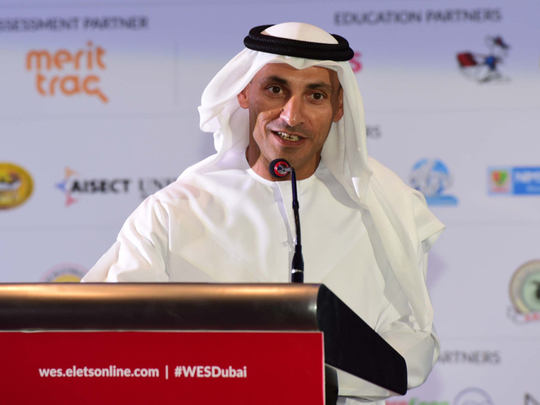
Dubai: The days of the “one size fits all” school model are numbered in Dubai, which is aiming to “future-proof” learning and make student “well-being” central to education, the World Education Summit heard on Sunday in Dubai.
Officials told the summit, which ends on Monday, that many jobs that schools are preparing their students for today won’t exist in the future because they will be replaced by robots and Artificial Intelligence.
In order to future-proof teaching and learning, schools in Dubai are increasingly adopting a more flexible curriculum and focusing on qualities such as leadership and creativity for students, officials added.
The pressure to innovate and adapt is also coming from parents who wield a greater power of choice in today’s competitive school market in Dubai compared to a decade ago, when limited “vanilla” or “classical” schools had the upper hand.
In his keynote address, Dr Abdulla Al Karam, director-general of the Knowledge and Human Development Authority, which regulates schools in Dubai, said change is also being driven by top global companies that have “removed academic qualifications from their entry criteria for graduates … saying that university degrees are no longer necessary”.
“They’ve done this because they can see that the type of graduates our education systems are producing are not always the type of graduates they need. These companies are looking for something different. If these big companies are doing this, you can be pretty sure that the smaller ones will follow,” Dr Al Karam said.
“Forward-looking companies … are looking for people who cannot be replaced by robots — people who have attributes that are distinctly human — attributes like empathy, like creativity, like positivity … What are we placing more importance on — the attributes that make us human, or the knowledge that makes us robots?”
End of an era?
Dubai is well-placed to lend importance to the right mix of attributes and knowledge, owing to its unique mix of schools and demographics, Kalthoom Al Baloushi, KHDA’s executive director of education development, said during her summit workshop.
There are 194 private schools in Dubai, teaching 17 different curricula to 300,000 students who come from 200 nationalities.
To rise above “vanilla or classical” schools, many schools are innovating their curriculum, rather than being distinctly British or Indian, for example, Al Baloushi added.
“The new kind of schools are focusing on well-being and happiness of students ... The era of ‘one size fits all’ is gone,” she said.
10X factor
Al Baloushi pointed towards programmes such as 10X, led by the Dubai government, where the private sector, including schools, are incentivised to “come up with ideas never done before”.
“We need that 10X factor in our schools. Maybe that could mean robots in the classroom, or no assessment or no set curriculum.”
Artificial Intelligence counsellors in schools?
A new trend is seeing Artificial Intelligence (AI) analyse cognitive test results of students to create a profile of their academic strengths and aptitude for certain careers, an exhibitor at the World Education Summit in Dubai said on Sunday.
Ajay Pathak, CEO of Dubai-based Footprint Solutions, said its GLOW App, which is in beta test phase with a number of UAE schools, uses results from students’ school test scores and the app’s own test results to compare the outcomes against students of similar demographics and scores around the world, to map the student’s strengths and weakness.
For example, a student’s school tests for maths may be high, but he or she may not be best suited for engineering because of low performance in the cognitive test assessing their application of knowledge in real-life problem solving scenarios, Pathak said.
The AI system of the app creates a profile of the student, highlighting the strengths and weaknesses in academics, as well as suitable and unsuitable career choices.
“A lot of school education systems are still based on rote memorising — you really don’t learn about your strength areas that way. Students will not run after degrees in the near future, they will learn what they like to learn, and learn the skills sets they need for the future. And AI, like this app, will grow exponentially — explode — in the next three to four years in schools,” he added.












